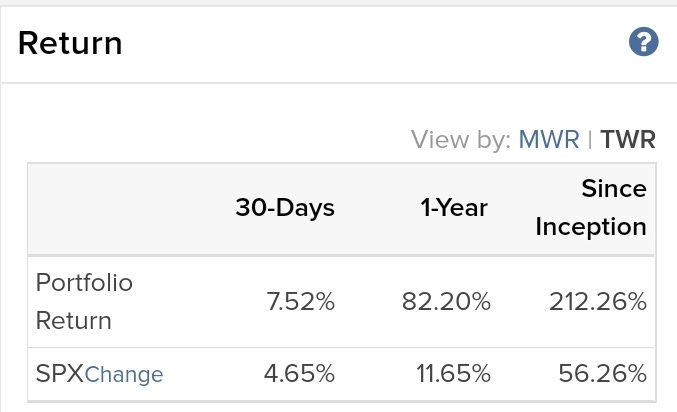Portfolio Update:
Last 7 Days: +3.48%
Year-to-date: +40.25%

Transactions this week:
Bought 300 Shares of Pager Duty (PD) at 36.97 per share = cost basis of $11,100
Pager Duty had its initial public offering (IPO) this week, which means it transitioned from being a privately held to a publicly traded company. It can be very risky to invest in IPOs because there is often a lot of hype around them (example Lyft). I’m staying far away from Lyft as an investment, partly because of all the hype around the IPO, but also because I feel there are better places for my money (my portfolio). Anyways, PD IPO’d after the Lyft fall out and its a rather unknown company so I didn’t feel there was excessive hype built up. Bottom line is I want to own shares of this company. So I bought a small position to start and I’ll look to add to it as the company executes well.
I think the company has strong numbers and a good product in an important field. I also really like what I know about their management team. CEO Jennifer Tejada and Chief Financial Officer Howard Wilson seem great. Alex Solomon is a Co-founder and is currently the Chief Technology Officer.
I also like that those three are listed last on the management page, not first like most companies. Speaks to what I hope is servant style leadership.
Pager Duty Links
2. Bought 90 Shares of Atlassian (TEAM) at $112.66 per share = cost basis of $10,100
Atlassian has been one of my favorite companies for a long time. Their products are top-notch and enable companies to plan, collaborate, and execute software projects which are becoming increasingly more important. The market cap is towards the top end of what we prefer, but the company has great leadership, great products, is innovative, and doesn’t spend much at all on sales and marketing so I’m giving it a shot.
Podcast about how Atlassian built a their company with no sales team
Bought 300 Shares of Smart Sheets (SMAR) at $40.19 = cost basis of 12,100
Out of these three companies, Smart Sheets is the company I’m least confident in. From my experience working as a project manager, I’ve never actually seen anyone use it. However, that’s a small sample size and they are relatively new, so that might change.
I set aside my doubts about their products because their sales numbers have been strong. However, I don’t intend to add to this position unless I see them continue to gain momentum. They’ll need to earn it. It will be the first company I sell if I want to add to something else.
Best of What I Read & Listened to This Week:
Motley Fool Rule Breaker Investing Podcast - Company Culture Tips Vol. 5
David Gardner, Lee Burbage, and Kara Chambers share 10 ways The Motley Fool workplace culture breaks the rules. I really love the way they do feedback and the idea that if you have to make sometime mandatory for employees, you’re likely doing it wrong.
I want to work at a place with a great culture. Which I firmly believe I do (www.lambdaschool.com/about).
As a career coach for students learning to be Software Engineers and UX/UI designers, I want to help them find careers with companies that have great cultures.
As an investor I want to be part owner of companies with great cultures.
As a parent and husband, I want our household to be a great culture. Where my wife and I are equal partners and teammates and where our kids can grow up curious, confident, and empowered.
You Have To Live It To Believe It by Morgan Housel of Collaborative Fund
Huge fan of Morgan and this is a long-form piece that is so worth the time
Basically comes down to how our opinions of things are seriously impacted by what we have (or have not) experienced in our past. Being conscious of this and which of those buckets we fall into can help us identify our biases and stay humble/respect others.
Jeff Bezos’ 2018 Letter to Amazon Shareholders
Letters like these are why I love investing. There’s so much to pull from this that will make me a better team member and more valuable to my employer. It’ll also make me a better investor.
Bezos really focused on the scalability of failure here. As a company grows, it has to be willing to have larger and larger failures. That’s the only way to truly move the needle for companies as large as Amazon. With that being said, this could be an absolute death sentence if companies (or people) take it out of context and take risks that aren’t aligned with what they can afford or where they are as a company. Interesting concept, but also something to approach carefully.
That’s all for this week. I hope you enjoy. Please share with your family and friends (and on social media!) and hit reply if you have any questions. Small shop here so you’ll get an answer directly from me!
Best,
Austin



